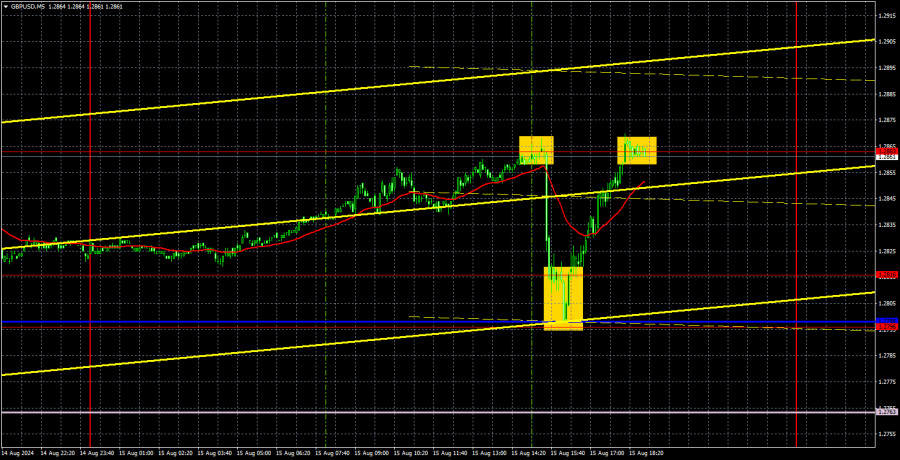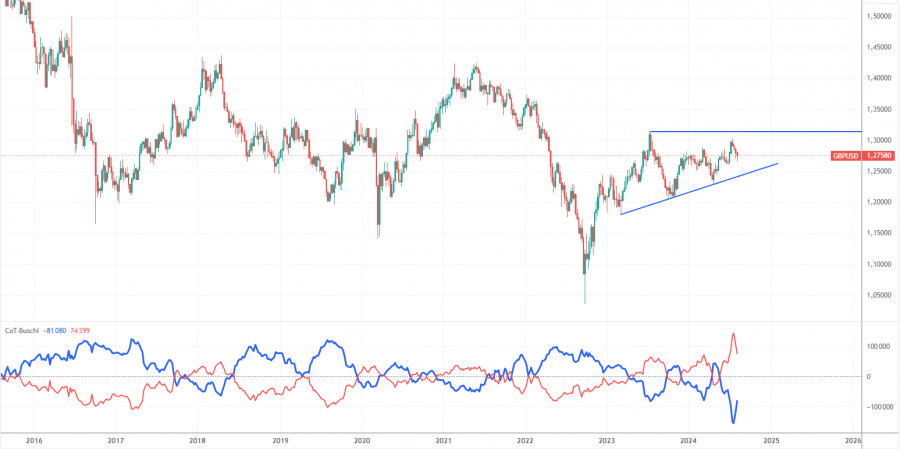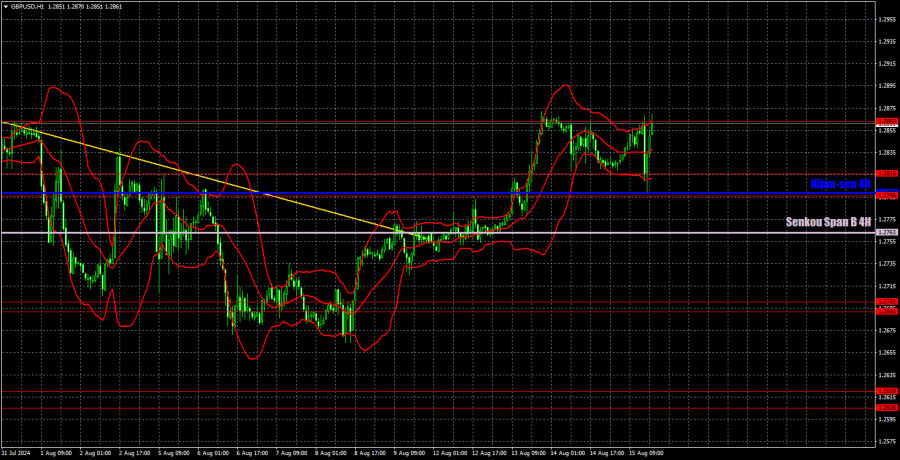Analysis of GBP/USD 5M

The GBP/USD pair also experienced a decline on Thursday due to US data, which for once were positive. However, before and after the release of the retail sales and jobless claims reports, the British pound, as usual, was rising. In the morning, its strengthening was triggered by a decent report on industrial production in the UK, and in the afternoon, the pound continued to rise for no particular reason. However, it can also be said that the dollar fell due to a weak report on industrial production in the US. As we see, when the dollar does rise, it is only for a brief period before it falls much more significantly. If one or two reports from the US are positive, a negative report usually follows immediately after.
The trend for the British pound remains unchanged. After breaking the descending trendline, we anticipated a relatively strong correction. The pound has been falling for three weeks, which is starting to feel unusual. Thus, the correction could be very deep, almost as significant as the previous decline. And if the data from across the Atlantic continue to be not even disastrous but merely allow the market to sell the dollar, the pair will continue to rise for a long time.
We still believe there are no fundamental reasons for the pound to rise significantly. The Bank of England has already started easing its monetary policy, and the market has already priced in about five rounds of Federal Reserve easing in advance.
However, the trading signals on Thursday were nothing short of excellent. The first sell signal was extremely difficult to act upon, as the price dropped 50 pips within 15 minutes. However, the rebound from the 1.2796-1.2816 area could be acted upon, after which the pair returned to the 1.2863 level. By the way, volatility was relatively low on Thursday – only 70 pips.
COT report:

COT reports for the British pound indicate that the sentiment among commercial traders has been constantly changing in recent years. The red and blue lines, representing the net positions of commercial and non-commercial traders, constantly intersect and are often close to the zero mark. According to the latest report on the British pound, the non-commercial group closed 39,600 buy contracts and 2,500 short ones. As a result, the net position of non-commercial traders decreased by 37,100 contracts over the week. But the buyers still have a considerable advantage.
The fundamental background still does not provide any grounds for long-term purchases of the pound sterling, and the currency has a real chance to resume the global downward trend. Nevertheless, an ascending trend line formed in the weekly time frame. Therefore, a long-term decline in the pound is unlikely unless the price breaches this trend line. Despite almost everything, the pound continues to rise, but even the COT reports show that major players are eager to buy it.
The non-commercial group currently holds 126,000 buy contracts and 51,700 sell contracts. However, apart from COT reports, nothing else indicates potential growth in the GBP/USD pair. Such a strong buyer's advantage suggests a possible trend change.
Analysis of GBP/USD 1H

In the hourly chart, GBP/USD has a real chance of continuing to rise as an upward correction begins. A decline remains the only logical and consistent scenario in the medium term when considering all factors: technical, fundamental, and macroeconomic. However, the market is again using any excuse to sell the dollar. And there are now reasons for that. Macroeconomic data on the labor market and unemployment in the US continue to disappoint repeatedly; this week, inflation data further hit the dollar. While the data wasn't particularly alarming, it was enough for the market.
For August 16, we highlight the following important levels: 1.2269, 1.2349, 1.2429-1.2445, 1.2516, 1.2605-1.2620, 1.2691-1.2701, 1.2796-1.2816, 1.2863, 1.2981-1.2987, 1.3050. The Senkou Span B (1.2763) and Kijun-sen (1.2799) lines can also serve as sources of signals. Setting the Stop Loss to break even when the price moves in the intended direction by 20 pips is recommended. The Ichimoku indicator lines may shift during the day, which should be considered when determining trading signals.
The UK is scheduled to release retail sales data on Friday, and the US will report on building permits and consumer sentiment. Thus, the market will again have something to react to.
Explanation of illustrations:
Support and resistance levels: Thick red lines near which the trend may end.
Kijun-sen and Senkou Span B lines: These Ichimoku indicator lines, transferred from the 4-hour timeframe to the hourly chart, are strong lines.
Extreme levels: Thin red lines from which the price previously bounced. These provide trading signals.
Yellow lines: Trend lines, trend channels, and other technical patterns.
Indicator 1 on COT charts: The net position size for each category of traders.
The material has been provided by InstaForex Company - www.instaforex.com #














 Download NOW!
Download NOW!
No comments:
Post a Comment